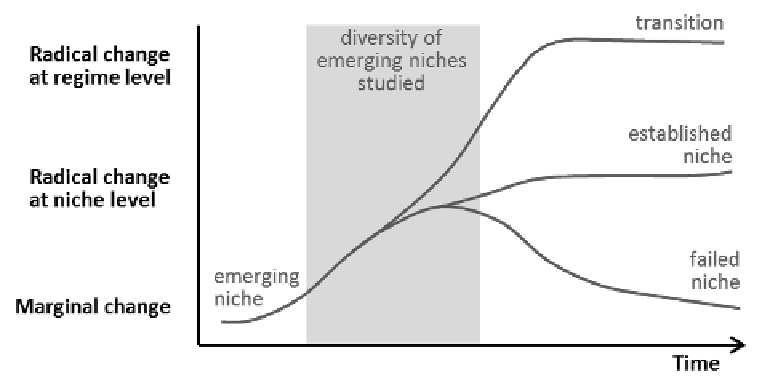Agriculture Reference
In-Depth Information
other, it leaves unquestioned many other aspects of modernized agriculture. Furthermore,
some niches may occur as a means to secure the survival of farming, when the dominant
regime does not offer a solution. This is the case in marginal farming areas, such as in
south-east Portugal, where the extensive silvo-pastoral livestock farming system in
Montado areas is under threat by both intensification and extensification trends. As a result,
a niche has emerged promoting multifunctional management and the re-valorization of the
quality of products, such as aromatic herbs and mushrooms, to support the survival of the
Montado (see Schiller
et al.
, this volume).
However, whilst niches themselves may not (currently) strive to initiate a transition, it
does not necessarily mean that they do not have a role to play in a (potential or wider)
transition. Indeed, the mere existence of alternatives can encourage other networks to
propose further alternatives, and each niche represents a potential for synergistic action at a
later point in time.
Fig. 13.1. The transformative ambition of the niche is important, as it will influence the pace
and effectiveness of a potential transition at regime level. There are also niches with no
ambition to change the dominant regime; wishing instead to establish themselves as a local
option. Yet, even this type of niche might contribute to initiating a transition if the idea is
'picked up' elsewhere by other actors, leading to niche proliferation. (Note that lines were
used in the figure for pragmatic reasons and should not imply that the trajectory is smooth
and linear: niche development is usually a contested and fragmented process).
(Source: authors)
Not only were the ambitions of some niches different to what was expected, a number
of case studies were not initiated by entrepreneurs but co-created through targeted
intervention by governments. For example, in the cases linked to high nature value farming
(see Peneva
et al.
, this volume),
two of the three niches studied were introduced through
targeted action by respective national governments, as part of combined environmental
protection and rural development initiatives. As explained above, the niche was supported
by the regime itself, as a means to find solutions for farm systems in decay due to their low
economic competitiveness, but still valuable from social and environmental perspectives.

Search WWH ::

Custom Search